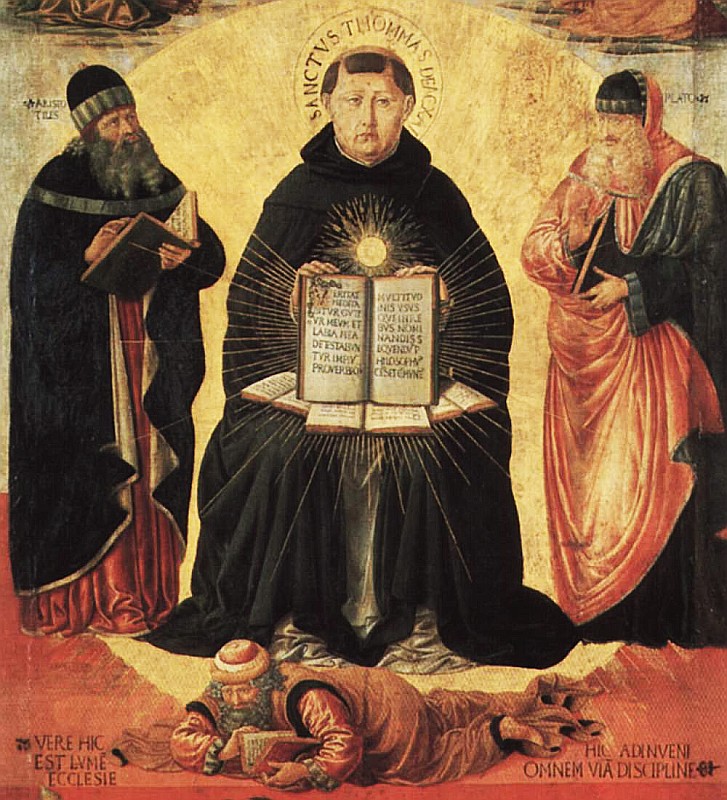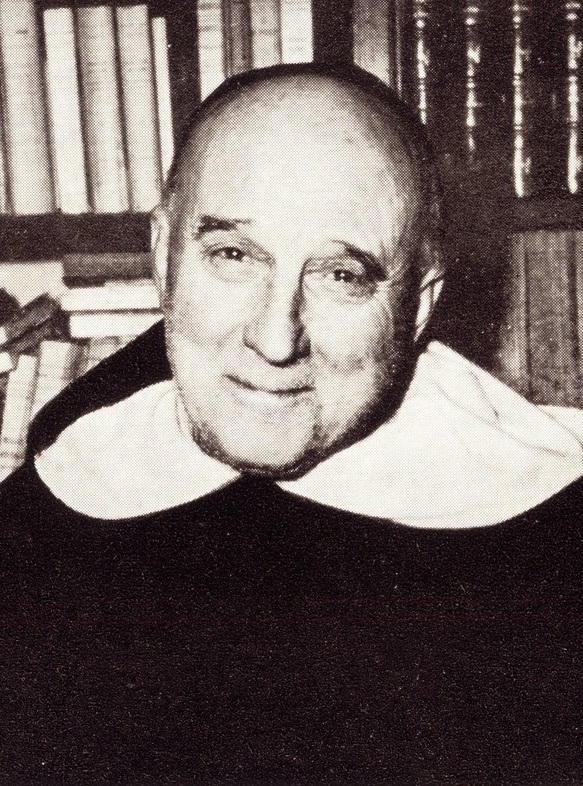The Eucharist as a Specification of the 'Sacraments of the Natural Law' in Aquinas
Aquinas Conference, Feb. 2, 2024
Francisco J. Romero Carrasquillo
St. Gregory the
Great Seminary (Diocese of Lincoln)
iteadthomaminstitute@gmail.com
ABSTRACT:
St. Thomas’ use of the term ‘sacrament’ in the IIIa Pars is
not strictly univocal, but is generic. The term describes not only the Seven
Sacraments of the New Law, but also the ‘sacraments’ of the Old Law of Moses,
and even the ‘sacraments of the law of nature’—a term he borrows from Hugh of
St. Victor. Before the institution of the Seven Sacraments, even before the
ritual prescriptions of the Old Law before Christ, the natural law itself has
always inclined men to give worship to the one God and to submit to Him.
Because of their hylemorphic nature, humans must show their submission to God
in a corporeal way, by way of signs, so that through what they do exteriorly
they may become intellectually aware of the spiritual reality that is being
expressed. For Aquinas this means that the practice of religion must involve
the use of some sort of natural sacramental economy. One prominent cultic
precept of the natural law is that all men universally must offer sacrifice to
God. The natural law prescribes this in communi without
specifying what sort of object/victim must be offered, or how, or when. It only
inclines us to offer a sensible thing to God as a sign of subjection and honor.
Yet positive law, especially divine positive law, determines this general
inclination and narrows it down to specific types of sacrifices. As is well
known, the ceremonies of the New Law are a perfection of those contained in the
Old Law. What is in need of greater appreciation is that the sacrifices of the
Old and New Laws are determinations of that which is already
prescribed universally to all men by the natural law. Throughout the Old
Testament there are many instances of the Old Law specifying the natural
precept to offer sacrifice. A fortiori, the Sacrifice of the Mass
is a further specification and perfection of the natural law precept to offer
sacrifices. By weaving together St. Thomas’ scattered texts on the issue, this
paper endeavors to explain how the Eucharist is not an arbitrary
imposition of the will of God upon the nascent Church, but a perfection of an
inclination that God already rooted in our human nature. Rather than being
something radically new in the history of salvation, the Eucharist is the
perfection and fulfilment of the ‘sacraments of the natural law’, an eminent
example of grace perfecting nature.
1) ST II-II.85.1c: [N}reason dictates to man that he must
be subject to some superior being, on account of the defects which he senses
within himself, and in regard to which he needs to be helped and directed by
someone superior. And whatever this [being] may be, this is what is called
‘God’ by all. Now just as in natural things the inferior are naturally subject
to the superior, so too natural reason dictates to man according to a natural
inclination that he should show subjection and honor according to his own mode
to that which is above man.
2) ST III.61.1c: The first of these
is taken from the condition of human nature, to which it is proper to be led
through corporeal and sensible things towards spiritual and intelligible
things.... Thus, therefore, through the institution of the sacraments man is instructed
through sensible things in a manner fitting to his nature.
3) ST I-II.95.2c: [I]t must be noted
that something can be derived from the natural law in two ways: as a conclusion
from principles, or as a sort of determination of commonalities. The first way
is similar to the way in which, in the sciences, demonstrative conclusions are
produced from principles. But the second way is similar to the way which, in
the arts, general forms are determined to something specific: like the
craftsman, who needs to determine the general form of a house to this or that
shape. Therefore, some things are derived from the general principles of the
natural law by way of conclusions; for instance, that “one ought not to kill”
may be derived as a conclusion from the principle that “one ought not to harm
anyone.” But some things [are derived] by way of determination; for instance,
the law of nature has it that the sinner should be punished; but that he be
punished with this particular punishment is a determination of the law of
nature. Each of these, therefore, is found in positive human law. But those things
that belong to the first way are contained in human law not as being mere
positive law, but have also some of the force of natural law; whereas those
things which belong to the second way have the force of human law alone.
4) ST I-II.103.1c: [W]hoever
worships God must worship Him through certain determinate things that pertain
to external worship. Now, the determination of divine worship pertains to
ceremonies, just as the determination of those things whereby we are ordered
towards our neighbor pertains to the judicial precepts.... And therefore, just
as among men in general there were certain judicial [precepts], yet not
instituted by the authority of divine law, but ordered by the reason of men, so
also there were certain ceremonies, not determined by the authority of any law,
but only according to the will and devotion of the men worshipping God....
Therefore before the Law there were certain ceremonies, yet not ceremonies of
the Law, because they were not instituted by any legislation.
5) ST III.61.3 ad 2: It was also
necessary that even in the Old Law there be determined certain sacraments of
the faith that they had in the Messiah who was to come: these sacraments are
compared to those sacraments that existed before the Law, as the determinate to
the indeterminate; for before the Law it was not fixed determinately what
sacraments were to be used, as it was through the Law. This was necessary both
on account of the clouding of the natural law, and so that there would be a
more determinate signification of the faith.
6) ST III.60.5, arg. 3: [I]n the
state of the law of nature determinate things were not required in the
sacraments, but were assumed through a vow, as appears in Genesis 28, where
Jacob vowed that he would offer to God tithes and peace-offerings.
7) ST III.61.3 ad 2: Consequently in the old Law
there was also a need for certain fixed sacraments significative of man’s faith
in the future coming of Christ: which sacraments are compared to those that
preceded the Law, as something determinate to that which is indeterminate:
insofar as before the Law it had not been established (praefixum) what
sacraments men were to use: whereas this was prescribed by the Law; and this
was necessary both on account of the overclouding of the natural law, and for
the clearer signification of faith.
8) ST III.60.5, arg. 3: As Augustine says (Contra Faust. 19), diverse
sacraments suit different times.... And therefore, just as under the state of
the law of nature men, to whom no law was given exteriorly, were moved by
inward instinct alone to worship God, so also the sensible things to be used
for the worship of God were determined for them by inward instinct. But later
it became necessary for a law to be given exteriorly, both on account of the
darkening of the Law of nature due to the sins of men and also for the sake of
a more express signification of the grace of Christ, whereby the human race is
sanctified. And therefore it became necessary to determine things which men
were to use in the sacraments.
9) SCG 3.120: Among other things which pertain to latria, sacrifice seems to be unique, for genuflections, prostrations, and other
such manifestations of honor may also be shown to men, although with a
different intention than to God. But everyone agrees that sacrifice should not
be offered to anyone unless he is thought to be God or unless one pretends to
think so. Now, an external sacrifice is representative of a true, interior
sacrifice, whereby the human mind offers itself to God. And our mind offers
itself to God as to the principle of its creation, as to the author of its
actions, as to the end of its beatitude. These things are found only in the
highest principle of things, for it was shown above that the creating cause of
the rational soul is the highest God alone; also He alone can incline the will
of man to whatever He wishes, as was shown above; it is also clear from the
above that the ultimate happiness of man consists solely in the enjoyment of
Him. Therefore, man ought to offer sacrifice and the worship of latria to the highest God alone, and not to any other spiritual substance
whatsoever.
10) SCG 3.119: Because it is connatural to
humans to receive knowledge through the senses, and it is most difficult to
transcend sensible things, God has provided for human beings that even among
sensible things there should be made for them a commemoration of things divine,
so that thereby the attention (lit, ‘intention’) of human beings may be called
back towards divine things. And for this reason sensible sacrifices have been
instituted, which humans offer to God, not as though God needed them, but to
represent to humans the fact that they ought to offer themselves and all they
have to God, as to their end, Creator, Ruler, and Lord of all.
11) ST II-II.85.1c: [T]he mode befitting to man is that he should use sensible signs in
order to express anything, because he receives knowledge from sensibles. And
therefore it proceeds from natural reason that man should use certain sensible
things, offering them to God as a sign of the due subjection and honor,
according to a similitude to those who offer certain things to their lord in
recognition of his dominion. Now this pertains to the ratio of sacrifice. And therefore the offering of a sacrifice pertains to
natural law.
12) ST II-II.85.1 ad 1: [S]ome things
taken generally (in communi) are of natural law, but their determination
is of positive law; for instance, it belongs to the natural law that evildoers
should be punished, but that they should be punished with this or that
punishment belongs is a matter of divine or human institution. Similarly also
the offering of a sacrifice in communi belongs to the natural
law, and therefore everyone agrees on this. But the determination of sacrifices
comes from human or divine institution, and therefore people differ on this
point.
13) In Hebr. 7, lect. 1: The ceremonial precepts
of the Old Testament are determinations of the precepts of the natural law and
of the moral precepts; therefore, in regard to what they had from the natural
law, they were observed before the Law without any precept. For the fact that
something is offered to God in recognition of His creation and dominion is
natural; but that He should be offered goats and heifers is a ceremonial
precept.... And this was done particularly because the main reason for
rendering worship to God is to signify that whatever a man has, he received
from God and that he depends on Him for his entire perfection.
14) ST II-II.85.4c: Those who are under the New or
Old laws are bound to do this differently from those who are not under the
law. For those who are under the law are bound to offer determinate
sacrifices according to the precepts of the law. But those who were not under
the law were bound to do certain things exteriorly in God’s honor, as became
those among whom they dwelt, and were not [bound to do] determinately these or
those things.






















